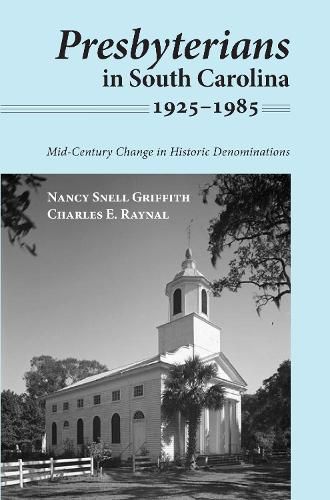Readings Newsletter
Become a Readings Member to make your shopping experience even easier.
Sign in or sign up for free!
You’re not far away from qualifying for FREE standard shipping within Australia
You’ve qualified for FREE standard shipping within Australia
The cart is loading…






This title is printed to order. This book may have been self-published. If so, we cannot guarantee the quality of the content. In the main most books will have gone through the editing process however some may not. We therefore suggest that you be aware of this before ordering this book. If in doubt check either the author or publisher’s details as we are unable to accept any returns unless they are faulty. Please contact us if you have any questions.
The history of South Carolina Presbyterians between 1925 and 1985 covers a period of great development achieved through many difficulties in church and society. We tell the story not only of the churches belonging to the PCUS, sometimes called southern Presbyterians, but also African-American churches and institutions in South Carolina established after the Civil War by PCUSA missionaries from the North. For all Presbyterians, events between the World Wars challenged the moral stances birthed by Protestants to build a Christian America. Women’s right to vote came to the nation in 1920, but claiming equality of women’s roles in mainline churches took decades of advocacy. The Great Depression engulfed the whole nation, eroding funds for churches, missions, and institutions. World War II set the scene for a great period of church expansion. When moral and cultural challenges came from the Civil Rights Movement and the war in Vietnam, the church increasingly began to face these issues and tensions, both theological and social, as they arose among the members of historic denominations. An effort began to reintegrate African-American churches into the Synod of South Carolina. As the Synod of South Carolina was taken up into a larger regional body in 1973, its more conservative churches began to withdraw from the PCUS. Many congregations began to shrink and the resources for mission diminished. In telling this story we hope to provide insights into how Presbyterians in South Carolina contributed to culture, connecting their religious life and practices to a larger social setting. May a fresh look at the recent past stir us to renewal ahead.
$9.00 standard shipping within Australia
FREE standard shipping within Australia for orders over $100.00
Express & International shipping calculated at checkout
This title is printed to order. This book may have been self-published. If so, we cannot guarantee the quality of the content. In the main most books will have gone through the editing process however some may not. We therefore suggest that you be aware of this before ordering this book. If in doubt check either the author or publisher’s details as we are unable to accept any returns unless they are faulty. Please contact us if you have any questions.
The history of South Carolina Presbyterians between 1925 and 1985 covers a period of great development achieved through many difficulties in church and society. We tell the story not only of the churches belonging to the PCUS, sometimes called southern Presbyterians, but also African-American churches and institutions in South Carolina established after the Civil War by PCUSA missionaries from the North. For all Presbyterians, events between the World Wars challenged the moral stances birthed by Protestants to build a Christian America. Women’s right to vote came to the nation in 1920, but claiming equality of women’s roles in mainline churches took decades of advocacy. The Great Depression engulfed the whole nation, eroding funds for churches, missions, and institutions. World War II set the scene for a great period of church expansion. When moral and cultural challenges came from the Civil Rights Movement and the war in Vietnam, the church increasingly began to face these issues and tensions, both theological and social, as they arose among the members of historic denominations. An effort began to reintegrate African-American churches into the Synod of South Carolina. As the Synod of South Carolina was taken up into a larger regional body in 1973, its more conservative churches began to withdraw from the PCUS. Many congregations began to shrink and the resources for mission diminished. In telling this story we hope to provide insights into how Presbyterians in South Carolina contributed to culture, connecting their religious life and practices to a larger social setting. May a fresh look at the recent past stir us to renewal ahead.